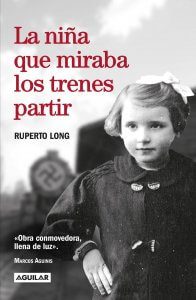As a child hiding from her would-be murderers in Nazi-occupied Belgium, Charlotte de Grunberg used to watch the trains leave town and disappear into the distance envying their freedom, not knowing the terrible cargo they carried.
For decades after moving to Uruguay she was discreet about her Holocaust experiences. Even when a writer expressed an interest in hearing more of her story she hesitated – until 2006 when news broke of the torturing to death in Paris of Ilan Halimi by a gang of antisemitic thugs.
“It was like the canary in the mine,” Professor de Grunberg (pictured above with her family) told the Uruguayan newspaper Busqueda. “It was then that I realised that the lid which I thought had been kept on antisemitism was a fantasy and I became more open to the idea of sharing my story.”
The result is the best-selling novel, La Nina que Miraba los Trenes Partir (The Girl Who Watched the Trains Depart). Winner of the 2016 Uruguayan National Golden Award, it has now been launched in Argentina by Penguin Random House.

Charlotte de Grunberg was just eight years old when she went on the run from the Nazis and their collaborators.
For the author, Ruperto Long, the book’s success affirms the uniqueness of the Nazis’ attempt to annihilate the Jews and how new generations continue to find the lessons of the war relevant.
But as a Jew and as an educator Professor de Grunberg, who is co-founder and Director of ORT Uruguay University, is left with questions.
In light of the horrors seen in our nightly news bulletins what have we, in fact, learned? And will we ever transform such events into practical pedagogical experiences?
Listen to Professor de Grunberg’s reflections made at the book’s launch (in Spanish with English subtitles).





